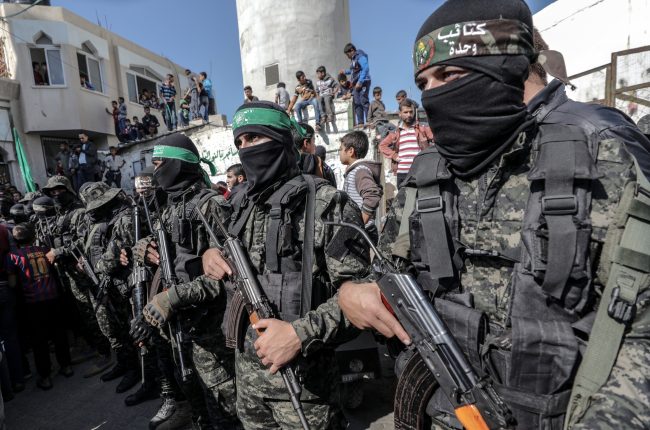Israel‘s military and Palestinian militants traded mortar bombs and airstrikes on Monday in what was possibly the deadliest exchange of fire in four years, but experts say the confrontation is unlikely to escalate into a full-blown war.

The latest flare-up in violence was prompted by a botched Israeli undercover operation in Gaza, which led to fighting that killed a Hamas commander, six other Palestinian militants and an Israeli colonel.
Palestinians in Gaza reacted by firing rockets and mortar bombs into southern Israel, while Israel launched airstrikes in retaliation.
READ MORE: Rockets fly between Israel and Gaza after botched raid, Hamas TV station bombed
Israel and Hamas have fought three wars since 2007, when the Islamist militant group seized control of Gaza from the internationally backed Palestinian Authority.
The most recent war, in 2014, resulted in the killing of over 2,200 Palestinians.
WATCH: UN official breaks down on TV while discussing 2014 Gaza crisis
Seventy-three people were killed on the Israeli side — that’s a price that Israel has no interest in paying again, says Hani Faris, adjunct professor of political science at the University of British Columbia and editor of the book The Failure of the Two-State Solution.
WATCH: 8 killed in covert Israeli military operation in Gaza

Faris said it’s likely that any further Israeli strikes will continue to be carried out from arm’s length.
“They will use long-range artillery as well as rockets and their air force to penalize the Gazans for resisting Israeli policies,” he said.
As for Hamas, the militant group has made noise in recent months about wanting to avoid another war.
“It’s in no one’s interest. We cannot prevail in a confrontation against a nuclear power,” said Yahya Sinwar, Hamas’ leader in the Gaza strip, in an interview with Israeli newspaper Yedioth Ahronoth last month.
“I am not saying I won’t fight anymore, I’m saying I don’t want more wars. I want the siege to end.”
WATCH: Missile hits Israeli bus traveling near Gaza border

Sinwar’s comments were made weeks before Monday’s escalation.
However, Emanuel Adler, chair of Israeli studies at the Munk School of Global Affairs, points out that the latest fighting only broke out because an Israeli military operation that was intended to be carried out under the radar was botched and exposed.
“The military operation that Israel did last night is of the type that it does at times and the public does not know about. This time, something went wrong and high-level commanders of both Hamas and Israel were killed, which prompted the current crisis and missile ‘volleys,'” Adler told Global News.
“Israel and Hamas were — with Egyptian help — negotiating a long-term truce when this happened.”
READ MORE: Israel says Iranian forces in Syria linked to rocket attacks by Palestinian militants
Faris says Egypt’s efforts in helping to bring Israel and Hamas closer to an agreement are unlikely to be abandoned anytime soon.
“Will the Egyptians continue with their mediation? Yes they will, because they don’t have any interest in having the Israelis attack or invade Gaza.
WATCH: Firefighters in Israel respond to scene of alleged rocket attack

On Monday, Egyptian state TV quoted sources saying that Egypt had separately encouraged both Israel and the Palestinians to commit to de-escalating the conflict in the Gaza strip.
“Egypt will interfere to try and get a ceasefire and continue with its attempt at rapprochement, and I think we’ll see that happening in the next day or two,” Faris said.
“I think things will cool down a bit, and then the Egyptians will step in and so will the Qataris, probably.”
Qatar has led a recent wave of financial relief efforts for Gaza, paying out a $15-million cash infusion to impoverished Palestinian civil servants in the Gaza Strip, with Israel’s agreement.
The cash infusion was paid out after Palestinian President Mahmoud Abbas, Hamas’s political rival based in the West Bank, slashed Gaza budgets, leaving tens of thousands of government employees broke and desperate.
Israel’s Environment Minister Zeev Elkin, a member of right-wing Israeli Prime Minister Benjamin Netanyahu’s security cabinet, told Tel Aviv radio station 102 FM that the money would not reach Hamas’ hands, saying, “It is money that is going to the salaries of civil servants, in an orderly, organized manner.”
WATCH: Gaza youth march to Jerusalem in protest

According to the Jerusalem Post, Hamas has looked to project the delivery of Qatari funds — and the blowing of the Israeli special forces’ cover during their Sunday night operation in Gaza — as victories in their own right, and is uninterested in all-out war at this time.
“Despite the attacks, Palestinians in the Gaza Strip believe that Hamas is still not interested in a major military confrontation with Israel,” read the Jerusalem Post analysis. “The leaders of Hamas feel they have more to lose from such a confrontation, especially in wake of recent moves to ease restrictions on the Gaza Strip.”
Rex Brynen, a political science professor at McGill University, told Global News that the political climates in both Israel and Gaza mean that an
“Hamas wants to make a point: ‘You can’t do this, we’ll fire back.’ And Israel wants to make the point: ‘You can’t fire rockets at us,’” Brynen said, adding that while domestic politics may encourage a temporary spike in hostilities, the scales will eventually tilt in favour of de-escalation.
Costanza Musu, professor of public and international affairs at the University of Ottawa, added that the Israeli military is not in favour of a large-scale invasion of Gaza due to the risk of heavy civilian casualties in the densely-populated area.
READ MORE: Why the latest Israel-Gaza conflict is escalating
Aaron Miller, director of the Middle East program at the Woodrow Wilson Center, said that Israel, Hamas and President Abbas are caught in limbo “between accommodation and conflict” due to the lack of a coherent strategy to end the conflict once and for all.
“Israel has no real strategy toward Palestinians. And it’s dealing with two highly dysfunctional actors – Abbas and Hamas who lack one too,” Miller said in a Twitter post. “It doesn’t want to make peace with former or war with latter. And so three drift caught between accommodation and conflict.”

Faris says Israel will also be aware that its relationship with key allies in the Middle East would be hurt by a fresh Gazan war.
“They have to think about their relationship with the Egyptians, Jordanians and other Arab countries, and what might happen on the northern borders of Israel, namely the Lebanese-Syrian border,” he said.
He suggested that Israel will also want to avoid attacks from non-Hamas elements who support the Palestinian cause.
“There will be other elements who might come to the defence of Gazans.”
READ MORE: Jordan says it won’t renew 25-year land peace deal with Israel
Adler agreed that a full-scale war is unlikely because it’s not in the interests of either Israel or Hamas, but he refused to categorically rule it out.
“Rationally, war should not take place because neither side wants it,” said Adler. “Thus, from a rational perspective, perhaps also because of Egyptian mediation, war should be averted.
“But in these cases, rationality only plays a small role.”
— With files from Reuters and Global News reporter Eric Stober




Comments